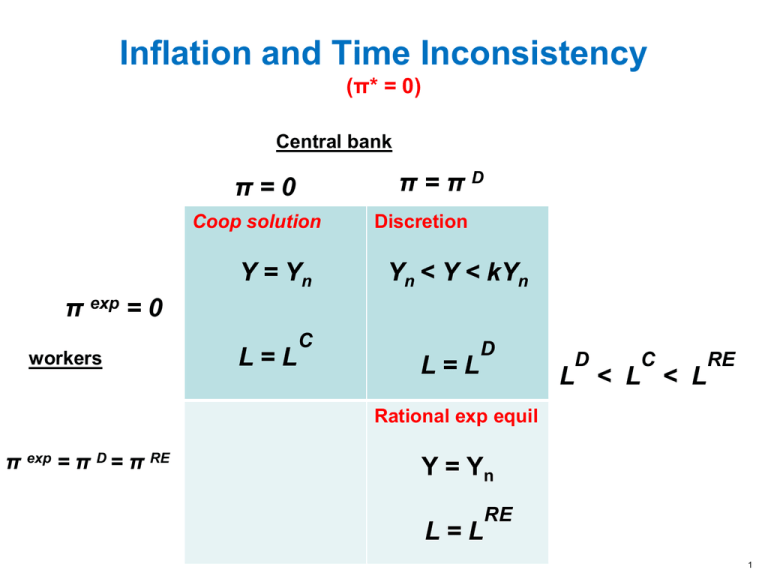
Inflation and Time Inconsistency
(π* = 0)
Central bank
π=πD
π=0
Coop solution
π exp = 0
workers
Y = Yn
L=L
C
Discretion
Yn < Y < kYn
L=L
D
D
C
RE
L < L < L
Rational exp equil
π exp = π D = π RE
Y = Yn
L=L
RE
1
The Crisis: where are we?
“Deleveraging”, “Quantitative Easing” and
“Tapering”
14.02 Spring 2014
2
United States: real house prices since 1880
© S&P Dow Jones Indices. All rights reserved. This content is excluded from our Creative
Commons license. For more information, see http://ocw.mit.edu/help/faq-fair-use/.
Source: S&P, Case-Shiller Index
3
Real house prices (indeces, 2000=100)
© IMF. All rights reserved. This content is excluded from our Creative Commons
license. For more information, see http://ocw.mit.edu/help/faq-fair-use/.
Source: IMF, World Economic Outlook, October 2013
4
House prices and household debt (mortgages)
leverage = 10
house
house
leverage = 9,18
debt and equity
100
equity
10
debt
90
house
house
debt and equity
101
equity
11
debt
90
leverage = 10
• The additional 9$ borrowed are
spent
• Leverage and amplification
• 1$ increase in house price
• 9$ increase in spending
house
debt and equity
house
101
equity
11
cash
9
debt
99
5
Households’ leverage ratios: debt to disposable income
Source: IMF, World Economic Outlook, October 2008
6
House prices and household debt (mortgages)
© IMF. All rights reserved. This content is excluded from our Creative Commons
license. For more information, see http://ocw.mit.edu/help/faq-fair-use/.
Source: IMF, World Economic Outlook, October 2013
7
Deleveraging: US Household saving
(percent of disposable income)
"Data Source: FRED, Federal Reserve Economic Data, Federal Reserve Bank of St. Louis:
Personal Savings; U.S. Department of Commerce: Bureau of Economic Analysis;
http://research.stlouisfed.org; accessed September 8, 2014."
8
Deleveraging: US Household consumption
(constant dollars)
"Data Source: FRED, Federal Reserve Economic Data, Federal Reserve Bank of St. Louis: US
Household Consumption; U.S. Department of Commerce: Bureau of Economic Analysis;
http://research.stlouisfed.org; accessed September 8, 2014."
9
The consequences of Banks’ Deleveraging
10
Asset prices and banks’ leverage
leverage = 10
assets
assets
leverage = 19
liabilities
100
capital
10
liabilities
90
assets
assets
liabilities
95
capital
5
liabilities
90
leverage = 10
assets
After a fall in asset values
banks sell asset:
Demand function slopes the wrong way !
assets
liabilities
50
capital
5
liabilities
45
11
The leverage cycle
12
12
Banks deleveraging: an example
Courtesy of the Federal Reserve Bank of Boston. Used with permission.
13
Banks’ leverage and deleveraging
© Bank of England. All rights reserved. This content is excluded from our Creative
Commons license. For more information, see http://ocw.mit.edu/help/faq-fair-use/.
Source: Bank of England
14
Bank deleveraging and bank lending to firms
© Bank of England. All rights reserved. This content is excluded from our Creative
Commons license. For more information, see http://ocw.mit.edu/help/faq-fair-use/.
Source: Bank of England
15
Bank deleveraging and bank lending to households and firms
© IMF. All rights reserved. This content is excluded from our Creative Commons
license. For more information, see http://ocw.mit.edu/help/faq-fair-use/.
Source: IMF, World Economic Outlook, October 2013
16
How long does a deleveraging cycle last ?
Japan: leverage of non financial corporations (1976 – 2010)
© Wiley. All rights reserved. This content is excluded from our Creative Commons
license. For more information, see http://ocw.mit.edu/help/faq-fair-use/.
Source: Koo, 2008
17
Reducing leverage: Japan 1990 - 2010
© Richard C. Koo. All rights reserved. This content is excluded from our Creative Commons license. For more information, see http://ocw.mit.edu/help/faq-fair-use/
18
Per-capita income after a banking crisis
average of 88 episodes
© IMF. All rights reserved. This content is excluded from our Creative Commons
license. For more information, see http://ocw.mit.edu/help/faq-fair-use/.
Source: IMF, World Economic Outlook, October 2009
19
Macroeconomics
how it responded to the crisis and the
challenges today
20
World Output Growth
© IMF. All rights reserved. This content is excluded from our Creative Commons
license. For more information, see http://ocw.mit.edu/help/faq-fair-use/.
Source: IMF, World Economic Outlook, April 2014
21
How did monetary and fiscal policy respond ?
22
However they responded, it worked !
This crisis and the Great Depression in the 1930s
World Industrial Output
Courtesy of Barry Eichengreen and Kevin Hjortshøj O'Rourke. Used with permission.
Source: Eichengreen and O’Rourke, Vox-EU, March 2010
23
Fiscal policy
© IMF. All rights reserved. This content is excluded from our Creative Commons
license. For more information, see http://ocw.mit.edu/help/faq-fair-use/.
Source: IMF, World Economic Outlook
24
US Federal Government debt
(percent GDP, 1940-2013)
Image is in the public domain courtesy of the Congressional Budget Office.
25
© IMF. All rights reserved. This content is excluded from our Creative Commons
license. For more information, see http://ocw.mit.edu/help/faq-fair-use/.
26
Monetary policy
© IMF. All rights reserved. This content is excluded from our Creative Commons
license. For more information, see http://ocw.mit.edu/help/faq-fair-use/.
27
Zero Lower Bound: the “Liquidity Trap”
• Spending shock shifts IS
to IS ‘
• Monetary policy response
shfts LM to LM ‘
• Zero Lower Bound
• Central bank buys asset,
prints money:
Quantitative Easing
• IS ‘ shifts up to IS ‘’
28
Quantitative Easing and the Holmstrom-Tirole model
•
•
•
ρ = i + x : interest rate at which firms can borrow
Investment = I (Y, ρ)
Crisis reduces banks’ capital (slide 11)
– x = f (capital of banks and own resources of entrepreneurs, A ) ↑
• for given i, Investment ↓
– Quantitative Easing raises banks’ capital x ↓
• For given i, Investment ↑
X down
x up
29
The «asset side» of the Federal Reserve’s balance sheet,before the crsis
Image is in the public domain courtesy of the Federal Reserve of New York.
30
The «asset side» of the Federal Reserve’s balance sheet, today
Image is in the public domain courtesy of the Federal Reserve of New York.
31
Quantitative easing
before
Central Bank
assets
Gvt bills
Commercial Bank
liabilities
100
cash
80
bank
reserves
20
assets
liabilities
Loans
50
Mortgage
backed
securities
30
deposits
90
Reserves at
the CB
20
equity
10
after
assets
liabilities
Gvt bills
100
cash
80
Mortgage
backed
securities
30
bank
reserves
50
assets
liabilities
Loans
50
Mortgage
backed
securities
0
deposits
90
Reserves at
the CB
50
equity
10
32
Quantitative easing and Credit easing
https://www.khanacademy.org/economics-finance-domain/corefinance/money-and-banking/federal-reserve/v/more-on-quantitativeeasing--and-credit-easing
33
Fed «Tapering» and its consequences
© IMF. All rights reserved. This content is excluded from our Creative Commons
license. For more information, see http://ocw.mit.edu/help/faq-fair-use/.
34
MIT OpenCourseWare
http://ocw.mit.edu
14.02 Principles of Macroeconomics
Spring 2014
For information about citing these materials or our Terms of Use, visit: http://ocw.mit.edu/terms.

